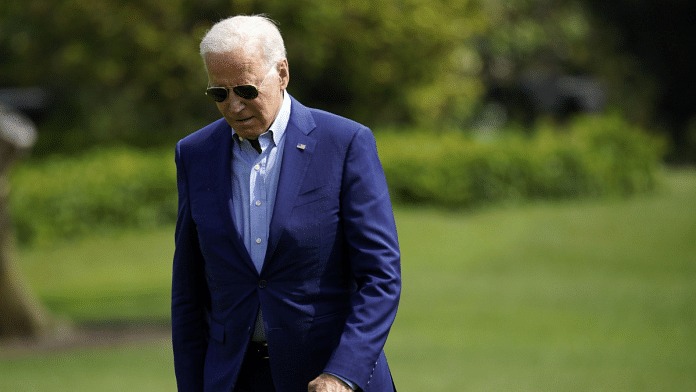It would please no one to recall the tragic 9/11 terror attacks on America, on its twentieth anniversary. But the Joe Biden administration in the White House appears determined on reminding the world in general and the Americans in particular about the unfortunate incident. It was this episode that had compelled the then President George W Bush to declare a ‘war on terror’ to be fought on the Afghan soil, initiating a series of actions, including banishing the Taliban forces from Kabul, dismissal of the government and taking over of the administration by the International Security Assistance Force.
Twenty years later, the US has made a hasty retreat from Kabul, handing over Afghanistan to the very same Taliban they ousted. Taliban and the Haqqani Network, two deadly terrorist outfits believed to be solely responsible for most of the terror attacks in the Western world, the homelands of NATO countries and host of other targets considered close to America’s war on terror, are back in Kabul now.
Threat has only become higher
Back in 2001, the geopolitical scenario was different and favourable to ‘victim’ America that had promptly sought the help of the democratic world in containing terrorism. But even then, the US heavily depended on Pakistan for the logistic support, a country which was deeply involved with the very perpetrators of terrorism. Twenty years after 9/11, the world economy has been badly hit by the Covid-19 pandemic, the democratic world has reset their priorities, China is posing a serious challenge to the global leadership status of the US, there is a marked increase in the number of flashpoints in every continent and in a worst case scenario, the debate about the decline of US power trajectory is gaining ground.
The present occupant of the White House and the security experts crowding the corridors of power in the US Congress seem to have relegated the threat from Taliban-sponsored terrorism to non-priority list and want us to believe that the phase of radical terror is over. It is difficult to fathom as to what makes them say this and even more difficult to believe them. One doesn’t need much proficiency in counter-terrorism to understand that complacency compounds the consequences of terror attacks.
While deciding on the plan to withdraw troops from Afghanistan, President Biden claimed in July 2021 to have succeeded in “delivering justice” to al-Qaida (by eliminating Osama Bin Laden) and thus achieved the objective of ensuring that Afghanistan will not be used as ‘a base from where attacks could be continued against the United States.
Ironically, the US President agreed that the Taliban was militarily stronger since 2001 when he assumed office in January last year. He also argued that the attacks on US and NATO personnel would drastically reduce since the decision to quit Afghanistan was implemented. But what the US does not tell the world is the hidden agenda of the Taliban to wrest power from the elected government in Kabul and undo all that the friends of the US in the region did to improve the situation there.
Also read: World wanted a Berlin moment in Afghanistan. It got a Taliban flag over Panjshir instead
Not seeing the complete picture
What the President of America does not realise or pretends not to take cognisance are two seminal facts.
One is that the Taliban 2.0 does not seem to be very different in their ideology, approach and actions from Taliban1.0 25 years ago. Whatever revengeful actions and dictate that are being reported from Kabul confirms that there is little or no change of heart among the top echelons of the Taliban leadership. Another aspect is the jubilation of having defeated the US and NATO forces and forced them to retreat practically unconditionally. And this time, they have China and Pakistan on their side, two countries that consider the US as their adversary.
While the Taliban leadership (consisting of nearly three dozen mullahs and about four or five terrorists listed under US sanctions list) would like to conceal their AK47s and Kalashnikovs before going around with a begging bowl, they would have no control over the mercenaries and affiliated trigger-happy radical groups. Some of them have already spread their tentacles far and wide in Africa and other regions that are exposed to social strife.
Ironically, Joe Biden, while emphasising on the need to quit Afghanistan made an assessment of global terror networks saying, “Over the past 20 years, the threat has become more dispersed, metastasizing around the globe: al-Shabaab in Somalia; al Qaeda in the Arabian Peninsula; al-Nusra in Syria; ISIS attempting to create a caliphate in Syria and Iraq, and establishing affiliates in multiple countries in Africa and Asia.” Going even by this assessment, is it difficult to predict what Taliban and its friends would do next?
The US President’s remark of “in together, out together” could very well turn out to be ‘in trouble together’. The US could boast of having one of the best counter-terrorism frameworks. But what about their democratic allies in the West, Europe and their friends in the Afghan region? The recent Covid-19 pandemic should be a warning on the possibilities of a biological war. The threat of deployment of smaller low-yield tactical nuclear warheads (capable of incinerating everything within 500 feet of the blast epicentre) by non-State actors cannot be ruled out.
Speaking on Covid-19, Joe Biden called for like minded partners to work together “to defeat this pandemic and strengthen the global health system to prepare for the next one, because there will be another pandemic”. One would wish he had said the same thing about 9/11 because, God forbid, there will be another one.
Seshadri Chari is the former editor of ‘Organiser’. Views are personal.
(Edited by Anurag Chaubey)



